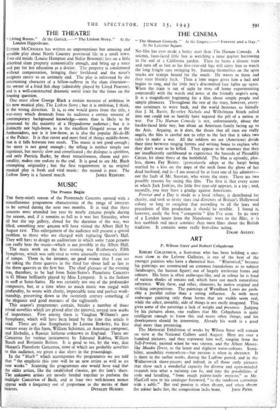THE THEATRE ESTHER MCCRACKEN has written an unpretentious but amusing
and sensible play about North Country provincial life in a small town. Two old maids (Louise Hampton and Nellie Bowman) live on a little inherited slum property economically enough, and bring up a niece pay for her education as a doctor. The property is condemned without compensation, bringing their livelihood and the niece's incipient career to an untimely end. The play is enlivened by the entertaining character of a fellow-sufferer in the slum clearance— the owner of a fried fish shop (admirably played by Lloyd Pearson), and is a well-constructed dramatic social tract for the times on the housing question.
One must allow George Black a certain measure of ambition in his new musical play, The Lisbon Story ; but it is ambition, I think, in the wrong direction. It is, as one would guess from the title, a war-story which demands from its audience a certain amount of contemporary background knowledge—more than is likely to be possessed by the majority of a Hippodrome audience ; but it is distinctly not high-brow, as is the excellent Gingold revue at the Ambassadors, nor is it low-brow, as is also the popular Hi-de-Hi at the Palace. It is that rarest and moat fatal of things middle-brow, that is it falls between two stools. The music is not good enough ; the story is not good enough ; the telling is neither simple nor ingenious, but merely slow and complicated ; the dialogue is spiritless, and only Patricia Burke, by sheer attractiveness, charm and per- sonality, makes one endore to the end. It is good to see Mr. Black attempting originality ; but the first requirement in an original musical play is fresh and vital music: the second is pace. The






























 Previous page
Previous page